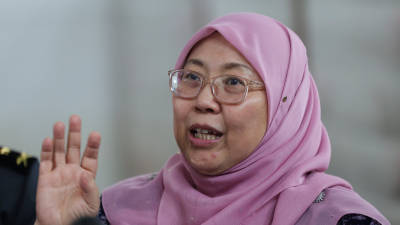PUTRAJAYA: The government is adopting a two-pronged approach to tackle the rising cost of living, namely by expanding the MADANI Rahmah Sales Programme (PJRM) and raising the minimum income floor to boost disposable income.
Deputy Minister of Domestic Trade and Cost of Living Datuk Dr Fuziah Salleh said the PJRM initiative allows the public to purchase essential goods at more affordable prices through discounts, ultimately helping them save more.
“We face challenges in controlling global market prices. For instance, when we import goods like onions, which we rely on 100 per cent from external sources, prices are dictated by the international market. Although we can’t control global prices, the government intervenes by implementing initiatives such as Rahmah Sales to offer discounts.
“This means, when people have limited disposable income, programmes like Rahmah Sales help make essential goods more accessible. Without such intervention, how can the people make the most of their remaining income?” she said in an exclusive interview with Bernama recently.
She emphasised that the government’s two-pronged approach, which focuses on enhancing disposable income and regulating the prices of essential goods, is a crucial step toward alleviating financial pressures on the people.
“The government is helping by increasing the income floor, which means improving people’s income and ensuring that their disposable income rises. At the same time, we are controlling the prices of essential goods,“ she said.
“Therefore, if anyone suggests that only one approach is sufficient, that’s inaccurate. The government has to, and is implementing both simultaneously,“ she said.
Fuziah said, for example, the government has taken various steps to increase the people’s income floor, including raising the minimum wage, adjusting the salaries of civil servants and setting the minimum wage rate, efforts aimed at ensuring people have more spending power.
She also highlighted the government’s commitment to expanding PJRM, noting that the allocation has been doubled from RM300 million to RM600 million this year, the programme can be held more frequently and expanded to cover all 600 state constituencies (DUN) nationwide..
“With RM300 million, Rahmah Sales could be held twice a month in each state constituency. With the increased allocation, the programme can now be held four times a month, or once every week, in each DUN.
“For example, if a parliamentary constituency has three DUNs, Rahmah Sales can rotate locations weekly. If someone misses the sale this week, they can visit another nearby DUN the following week. We ensure that these sales are always available and easily accessible. It has become one of the most popular initiatives among the public,“ she said.
Meanwhile, regarding the proposal to expand the list of Basic Rahmah Contribution Assistance (SARA) items, Fuziah explained that the initiative is under the Ministry of Finance (MOF), while the KPDN always conveys the feedback received from the people to the relevant parties.
“MOF is listening and will continue to add to the SKU (stock keeping unit) list. I saw it myself when I went to the supermarket where even women’s essentials have various brands included, and so are instant noodles,“ she said.
She said that improving the list of SARA items is a continuous process that is carried out based on the needs and feedback of consumers.
“The government is always listening to the people’s needs, and improvements will be made accordingly,” she added.
Fuziah also reaffirmed the government’s commitment to maintaining a fair and transparent business development ecosystem, free from cartel interference.
She said this is being pursued through various mechanisms under the ministry’s supervision, including the Malaysian Competition Commission (MyCC), oversight of profiteering activities, and supply chain management.
“We monitor all aspects of the market. We have price inspectors, enforcement teams, and several legislative instruments in place to ensure fairness and transparency,” she said.
The ministry, she said, also conducts routine price monitoring through the Price Catcher application and regular inspections by enforcement officers.
“These efforts ensure that business development in the country is well-regulated and equitable for all parties,” she said. – Bernama
